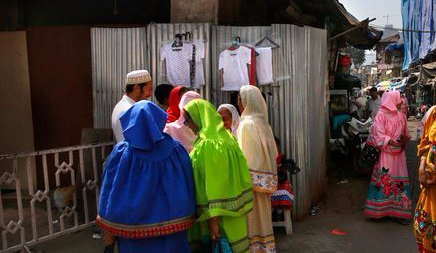By Saleha
Country of Residence: Canada
Age: 45
Having lived in South-East Asia, and being exposed to multiple races and cultures, I grew up in a very open-minded family. As a child, my family and I occasionally went to the local Bohra mosque to socialize with others in the community. I loved going to the “masjid” – there I got a chance to meet my best friend and also eat delicious Bohri food. It was wonderful to see all the aunties dressed up in “onna ghagra” which are colourful skirts with matching chiffon scarves draped around the head. After the prayers, everyone congregated outside and chatted into the late hours of the night.
Then suddenly in the early 90s it all changed. The upper echelons of the Bohra clergy instated new rules. The progressive Dawoodi Bohras were no more; instead, women were forced to wear a form of hijab called “rida” and men were made to sport a beard, wear a kurta, and “topi” or a cap on their heads. The clergy, headed by the Syedna, began to exert control over everything. Permission from Syedna was required not only for religious matters but in daily life as well. For example, permission was needed to start a business, get married or even to be buried. Female Genital Cutting or khatna was deemed necessary, even though that act of it is not prescribed in the Koran. If any of the rules were not followed, or if you protested and spoke against them, you were excommunicated or threatened to be. You’d lose all your ties to friends and family forever.
I can never forget the awful day, when I was seven, while on a holiday in India, my aunt asked me to go shopping with her. She took me to a dingy place where a Bohri man and woman took me inside. They asked me to undress waist down, and when I protested, the man held my hands while the woman removed my jeans and underwear and forced me to lie down. I saw the man take out a blade and I struggled and screamed for help, while they proceeded to cut me. I lay bleeding on the floor, unable to comprehend what had happened to me. It was horrific, painful, and demeaning. I hated what was done to me. I hated that my mom was not there. I was angry at my aunt for allowing them to hurt me.
I remember that experience vividly and to this day I am infuriated that I had to go through this ordeal as a child in the name of religion. While the majority of the Muslim communities around the world have spoken against this, the Dawoodi Bohra religious authorities urge continuing FGC under the guise of cleanliness. The worst part is that some women push this practise on vulnerable children too young to give consent, instead of protecting them as adults should.
It was a difficult time for me. Having grown up with all the freedom in the world, it was suddenly being taken away from me and I grew cynical of my Bohra culture and wanted no part of it. Today, I am happy I decided to leave the fold. It was not hard to leave. In fact, it was liberating. I was not comfortable with the more rigorous path that my community was taking. I am sure there are many other Bohri people out there who are quietly questioning many of the beliefs handed down to them – some so silly, useless, and others very damaging – Bohris must refrain from using Western toilets; Bohris cannot host or attend wedding functions in secular, non-Bohra venues; brides can apply mehndi only an inch below the wrist and cannot hold the traditional “haldi” functions; and all Bohris must carry a RFID photo ID which will monitor attendance to the mosque.
Humanity has achieved such remarkable progress. We have ventured into space, developed cloning and gene editing technologies, and most importantly, the Internet has resulted in globalization and interconnection between various cultures and communities. In this light, I wonder why we are still talking about FGC and the right to choose to do it to our daughters in this day and age? I am thankful that organizations like Sahiyo and We Speak Out have become a voice for children who are being hurt in the name of religion.
I look at my children and I see the most informed, connected, and progressive generation. Imposing impractical, harmful religious rules such as continuing FGM on such a generation will only drive them further from our culture. More and more Bohri women and men are speaking out against this harmful practise because whenever religion becomes too rigid, too corrupt, it begins to crack. My hope is that our community can find the strength to break free from all the rigid practices and once again become the most progressive community among the Muslims.

